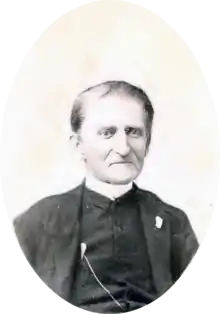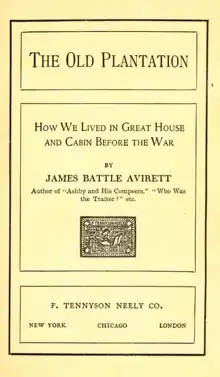James Battle Avirett
James Battle Avirett (March 12, 1835 – February 16, 1912) was an American Confederate chaplain and author. He was the first chaplain commissioned to serve in the Confederate States Army in 1861.[1] His The Old Plantation: How We Lived in Great House and Cabin before the War, published in 1901 was a nostalgic description of life on a plantation in the Antebellum South. By the time of his death, he was "the last surviving Confederate chaplain."[2]
James Battle Avirett | |
|---|---|
 | |
| Born | March 12, 1835 |
| Died | February 16, 1912 (aged 76) Cumberland, Maryland, U.S. |
| Resting place | Winchester, Virginia, U.S. |
| Alma mater | University of North Carolina at Chapel Hill |
| Children | John W. Avirett, Philip W. Avirett |
| Parent(s) | John Alfred Averitt Serena Thomas |
Early life
James Battle Avirett was born on March 12, 1835 in Richlands, North Carolina.[3] On his paternal side, he was of German-Huguenot descent.[4] His father, John Alfred Alvirett, was a large planter and sheriff of Onslow County, North Carolina.[4] He grew up on the Avirett-Stephens Plantation.[3]
Avirett attended the University of North Carolina at Chapel Hill from 1850 to 1852.[3] He was ordained as an Episcopal priest by Bishop William Meade in 1861.[3]
Career
Avirett was a priest of the Episcopal Church.[3] During the American Civil War of 1861-1865, he served as a chaplain in the Confederate States Army in Alabama, under General Turner Ashby.[2][5][6] He was the first chaplain to be commissioned to serve in the CSA in 1861.[1]
Avirett served as the president of the Dunbar Institute, an Episcopal female seminary in Winchester, Virginia from 1865 to 1871.[3] For the next twenty-five years, he was a priest in Sligo, North Carolina, Upper Marlboro and Silver Spring, Maryland,[5] followed by Waterville, New York.[3] He served as the rector of St Paul's Church Louisburg, North Carolina from 1894 to 1899.[7]
Avirett was the author of several books. As early as 1867, he wrote a memoir of General Turner Ashby, after he had given a speech about Ashby at the University of Virginia.[8] By 1897, he wrote two religious pamphlets.

Avirett published The Old Plantation: How We Lived in Great House and Cabin before the War in 1901.[3][5] He had been encouraged to write about plantation life by Senator Zebulon Baird Vance. Prefaced by Hunter McGuire, it was presented as a response to Uncle Tom's Cabin.[9] For David Anderson, a Senior Lecturer in Cultural and Political Studies at Swansea University, the book was emblematic of nostalgic memoirs about the Old South, which was lost forever except in writing and memories.[10] However, David Goldfield, a Professor of History at the University of North Carolina at Charlotte, suggests that it was "much less a re-creation of plantation life than a fantasy, part of the full-blown rehabilitation of the Old South that had been underway since the end of Reconstruction."[11]
Avirett was a regular contributor to the Cumberland Evening Times, a newspaper in Cumberland, Maryland.[5]
Personal life
Avirett married Mary Louise Dunbar Williams of Winchester, Virginia, in 1862.[6] His wife was a driving force in the establishment of the Stonewall Cemetery,[6] a Confederate cemetery near the Mount Hebron Cemetery and Gatehouse in Winchester, Virginia. The couple had two sons, John Williams Avirett (1863 - 1914), who was the owner of the Cumberland Evening Times, and Philip Williams Avirett (1867 - 1902), a lawyer and newspaper editor.[5][1]
Death
Avirett died on February 16, 1912 in Cumberland, Maryland.[3][5] By the time of his death, he was the last surviving Confederate chaplain.[2] He was buried in Winchester, Virginia.[3]
Bibliography
- The Memoirs of General Turner Ashby and His Compeers (1867).
- Watchman, What of the Night? or The Causes Affecting Church Growth (1897).
- Who Was the Rebel ? (1897).
- The Old Plantation: How We Lived in Great House and Cabin before the War (1901).
References
- "Col. Avirett Died Suddenly". The Charlotte News. Charlotte, North Carolina. May 29, 1914. p. 1. Retrieved December 26, 2015 – via Newspapers.com.

- "Last Surviving Chaplain of the Confederate Army, Dr. James Battle Avirett, Is Dead". The Cincinnati Enquirer. Cincinnati, Ohio. February 17, 1912. p. 4. Retrieved December 26, 2015 – via Newspapers.com.

- Littleton, Tucker Reed. "Avirett, James Battle by Tucker Reed Littleton, 1979". NCPedia. State Library of North Carolina. Retrieved December 26, 2015.
- Cecelski, David (2000). An Historian's Coast Adventures into the Tidewater Past. Winston-Salem, North Carolina: John F. Blair, Publisher. ISBN 9780895871893. Retrieved December 26, 2015.
- "Rev. Dr. Avirett Dead. Probably Last Surviving Chaplain in the Confederate Army". The Washington Herald. Washington, D.C. February 17, 1912. p. 7. Retrieved December 26, 2015 – via Newspapers.com.

- "Honor Them. A Sacred Duty to Perform. Four Hundred Unmarked Confederate Graves--North Carolinians Who Lie Buried in Winchester, Va.--An Effort Made to Properly Mark the Resting Place of These Heroes". The Henderson Gold Leaf. Henderson, North Carolina. October 24, 1895. p. 1. Retrieved December 26, 2015 – via Newspapers.com.

- "Louisburg Loses Mr. Avirett". The Franklin Times. Louisburg, North Carolina. May 26, 1899. p. 3. Retrieved December 26, 2015 – via Newspapers.com.

- Anderson, Paul Christopher (2006). Blood Image: Turner Ashby in the Civil War and the Southern Mind. Baton Rouge, Louisiana: Louisiana State University Press. p. 13. ISBN 9780807131619. Retrieved December 26, 2015.
- "Uncle Tom's Cabin". The Carolina Mascot. Statesville, North Carolina. September 14, 1899. p. 1. Retrieved December 26, 2015 – via Newspapers.com.

- Anderson, David (February 2005). "Down Memory Lane: Nostalgia for the Old South in Post-Civil War Plantation Reminiscences". The Journal of Southern History. 71 (1): 105–136. JSTOR 27648653.
- Goldfield, David R. (2004). Still Fighting the Civil War: The American South and Southern History. Baton Rouge, Louisiana: Louisiana State University Press. p. 21. ISBN 9780807129609. Retrieved December 26, 2015.